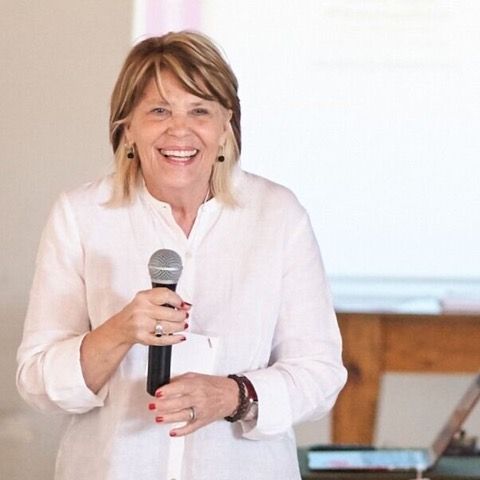
Treating Trauma and Addiction with the Felt Sense Polyvagal Model
A Bottom Up Approach

"In Treating Trauma and Addiction with the Felt Sense Polyvagal Model Jan Winhall introduces a new strategy to treat addiction that brilliantly integrates Gendlin’s classic concept of a felt sense with Polyvagal Theory..."
- Stephen W. Porges, PhD, Distinguished University Scientist, founding director, Traumatic Stress Research Consortium, Kinsey Institute, Indiana University Bloomington; professor of Psychiatry, University of North Carolina at Chapel Hill.
The International Focusing Institute, in a USABP Spotlight Series Event, present a new way of understanding and treating trauma and addiction. Introduced by Jan Winhall.
This webinar presents a new way of understanding and treating trauma and addiction. The Felt Sense Polyvagal Model provides a paradigm shift from the traditional disease approach to an embodied understanding of trauma and its underbelly, addiction, through the lens of the autonomic nervous system.
This course comes with:
- Video that includes theory, training, experiential, and client demo
- Quiz - Coming soon!
- Handouts (body cards) to use for yourself and with clients
- Articles to support your understanding and for greater insight
- Training slides from the presentation
Get the full course description below.
USABP Annual Members and Non-Member's freely enrolled here on this site can take courses with or without applying for CE credits (not all courses offer CE credits).
2 CEs will be available for this home study course. Coming soon. Check back starting April 10th.
Course Costs
- USABP Members do not have to pay the $45 dollar course fee listed on this site.
- This Course is available for $45 to USABP non-members.
- For an additional $15 processing fee USABP Members and Non-Members can receive 2 CE credits for this course.
Live Event Registrant Information
- USABP Members do not have to pay the $45 dollar course fee listed on this site. Members who want CE credits do have to pay the CE processing fee (when CE credits are listed as available)
- Non-members who paid for the live version of this home study course (at USABP.org) do not have to pay the $45 dollar course fee listed on this site.
- Non-Members, who paid for the live course event or home study version here, and want CE credits do have to pay the CE processing fee (when CE credits are listed as available).
Discount Check-Out Instructions:
For Members and Live Event Paid Registrants
- Use your 100% off discount code during the checkout process.
- eMail info@usabp.org to request your discount code (it will deduct 100% off for this course on this site). Please identify in the email the course you are referring to and whether you are a USABP Member or a Non-Member Live Event Paid Registrant for this course.
NOT A MEMBER or Paid Event Registrant and WANT THE DISCOUNT?! Plus, many more $avings and benefits? Join us. Contact info@usabp.org for more assistance.
Course Description
The International Focusing Institute, in a USABP Spotlight Series Event, present a new way of understanding and treating trauma and addiction. Introduced by Jan Winhall.
This webinar presents a new way of understanding and treating trauma and addiction. The Felt Sense Polyvagal Model provides a paradigm shift from the traditional disease approach to an embodied understanding of trauma and its underbelly, addiction, through the lens of the autonomic nervous system.
Addictions are seen as the bodies’ attempt to emotionally regulate by acting as propellors that facilitate shifts in our nervous system. The model Integrates Gendlin’s Felt Sense process with Porges Polyvagal theory, enabling us to appreciate addictive behaviors as adaptive responses to maladaptive environments. The model provides a generic framework that can be integrated into any therapeutic modality. The webinar will include a description of how to apply the model with clients through participant exercises, case examples, and a live demonstration.
Summarizing Main Points of Workshop
• Introducing the journey over forty years of clinical experience in developing the Felt Sense Polyagal Model. Including: Critiquing current top-down ways of treating addiction and the need for a bottom-up approach.
• Describing the evolution of the model, three graphic versions as they developed. First Model: Felt Sense Experience: Feminist, Trauma-informed model includes a description of Gendlin’s Felt Sense and Focusing-Oriented Psychotherapy
• Second Model: Felt Sense Experience Model of Treating Addiction. Description of Siegel’s Interpersonal Neurobiology as it integrated into the model to build on the theoretical framework. The role of attachment as it relates to addiction and trauma.
• Third Model: The Felt Sense Polyvagal Model to treat Trauma and Addiction. Description of Polyvagal theory as it integrates into the model. Addictions are seen as propellors of neurophysiological state changes in the autonomic nervous system. Introduction of the two graphic versions of the model, client, and clinician.
• Application of the Model with Clients. Description of the felt sense experience of each state and how to promote healing through neural exercises such as Focusing-Oriented Strategies. Use of Three Circle Practice and working in Groups.
• Live Demonstration of Application of the Felt Sense Polyvagal Model with a client.
Learning Objectives
Participants will be able to:
1. describe the two branches of the traditional model of the autonomic nervous system and Porges contribution of the third branch (Polyvagal Theory), the dorsal vagus, and the social engagement system.
2. describe the basic neurophysiological states of the Felt Sense Polyvagal Model for treating addiction and trauma.
3. explain addictive behaviors through the lens of Polyvagal theory.
4. name the four avenues into Gendlin’s concept of Felt Sense and how to apply this embodied practice in psychotherapy.
Bibliography References
Afford, P. (2020). Therapy in the age of neuroscience. New York & London: Routledge.
Alexander, B. (2008). The globalization of addiction, A study in poverty of the spirit. New York, NY: Oxford University Press, 2008.
Badenoch, B. (2008). Being a brain-wise therapist: A practical guide to interpersonal neurobiology. New York, NY & London: W.W. Norton & Company.
Dana, D. (2018). The polyvagal theory in therapy. New York, NY & London: W.W. Norton & Co.
Gendlin, E.T.(1996) Focusing Oriented Psychotherapy, New York, Guilford Press.
Gendlin, E. T. (1978/1981). Focusing. New York, NY: Bantam Dell.
Herman, J. (1992). Trauma and recovery. New York, NY: Basic Books.
Haines, S. (2019). The politics of trauma. Berkeley, CA: North Atlantic Books.
Lewis, M. (2015). The biology of desire: Why addiction is not a disease. New York, NY: PublicAffairs.
Maté, G. (2018). In the Realm of Hungry Ghosts: Close encounters with addiction. Toronto, Ont.: Toronto Vintage Canada.
Porges, S. (2011). The polyvagal theory. New York, NY & London: W.W. Norton & Co.
Porges, S. (2017). The pocket guide to the Polyvagal Theory: the transformative power of feeling safe. New York & London: W.W. Norton & Co.
Porges,S. Dana,D. (2018). Clinical Applications of The Polyvagal Theory. Ed. New York & London: W.W. Norton & Co.
Siegel, D. J. (1999). The developing mind: Toward a neurobiology of interpersonal experience. New York, NY & London: The Guilford Press.
Tatarsky, A. ((2002). Harm Reduction Psychotherapy. New York. Rowman and Littlefield Publishers.
Van der Kolk, (2014). The body keeps the score. New York, NY: Penguin Books.
Winhall, J. (2014). Understanding and Treating Addiction with the Felt Sense Experience Model. In G. Madison, Ed.) Emerging practice in focusing-oriented psychotherapy. London: Jessica Kingsley Publishers.
If you have any questions please don't hesitate to contact usabp@usabp.org
Get Focusing Institute Training and Resource Info.
More Testimonials
"...Jan Winhall has produced a brilliant synthesis and expansion of addiction theory and treatment that should be read by all therapists, not just addiction specialists."
~ Harville Hendrix, PhD, and Helen LaKelly Hunt, PhD, authors of Doing Imago Relationship Therapy in the Space Between
~ Gabor Maté, MD, is the author of In the Realm of Hungry Ghosts: Close Encounters with Addiction
About Our Courses
Check back as new information on our events happen regularly and updates are ongoing.
These exclusive webinars are brought to you by the USABP and its proud educational and training institute member organizations.
These live and home study webinars are for Psychologists, Social Workers, MFTs. Counselors, Somatic Practitioners, Body Workers, and other Health Professionals.
They often include demonstrations, video and slide presentations, experiential exercises, Q & A discussions, insights from attendees, presenter shares about their personal journey and inspirations, and much more.
These courses content levels serve introductory or beginning level; intermediate level; or advanced level.
For questions or concerns, phone 202-466-1619.
There is no conflict of interest or commercial support for this program.
Satisfactory Completion
When CE credits apply to a course they are made available upon course completion by emailing usabp@usabp.org to request it.
Participants must have paid the tuition fees, logged in and out each day, attended the entire webinar, and completed an evaluation to receive a certificate. Failure to log in or out will result in forfeiture of credit for the entire course. No exceptions will be made. Partial credit is not available. Certificates will be available following course completion. This includes passing the quiz.
Disability Access - If you require ADA accommodations please contact our office 30 days or more before the live event or for assistance with login. We cannot ensure accommodations without adequate prior notification.
Please Note: Licensing Boards change regulations often and while we attempt to stay abreast of their most recent changes, if you have questions or concerns about this course meeting your specific board’s approval, we recommend you contact your board directly to obtain a ruling.
Your Instructor

